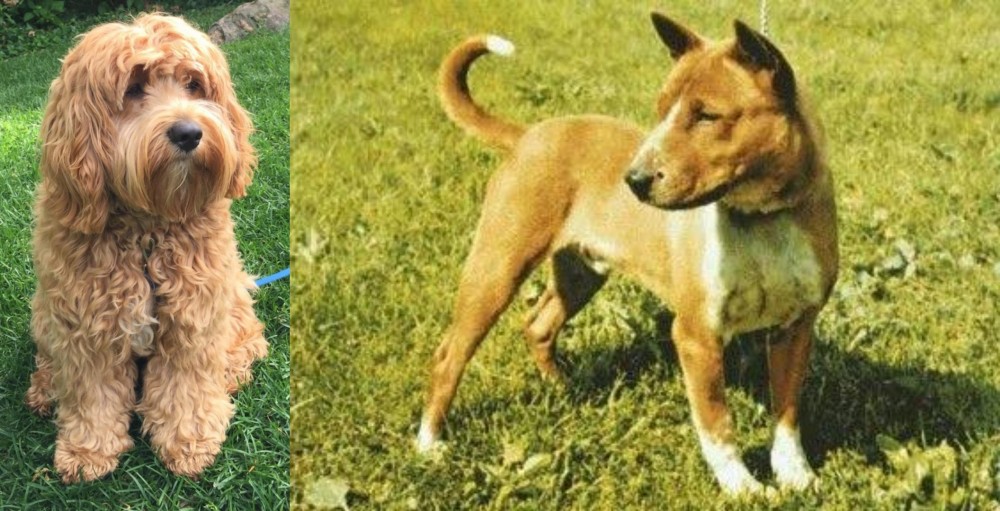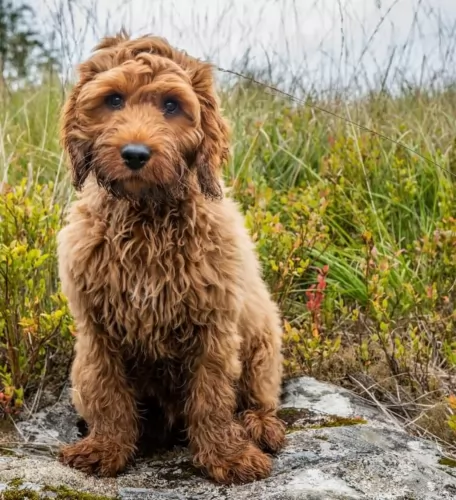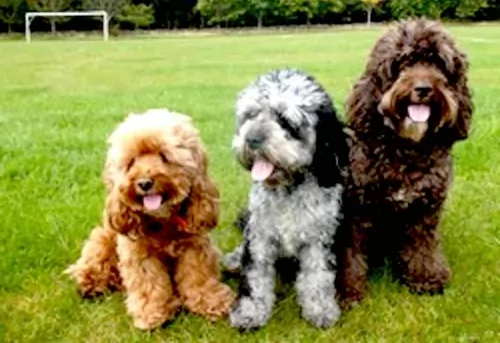 Petzlover
Petzlover Cockapoo is originated from United States but Telomian is originated from Malaysia. Cockapoo may grow 10 cm / 3 inches shorter than Telomian. Both Cockapoo and Telomian are having almost same weight. Both Cockapoo and Telomian has almost same life span. Both Cockapoo and Telomian has almost same litter size. Both Cockapoo and Telomian requires Moderate Maintenance.
Cockapoo is originated from United States but Telomian is originated from Malaysia. Cockapoo may grow 10 cm / 3 inches shorter than Telomian. Both Cockapoo and Telomian are having almost same weight. Both Cockapoo and Telomian has almost same life span. Both Cockapoo and Telomian has almost same litter size. Both Cockapoo and Telomian requires Moderate Maintenance.
 The gorgeous Cockapoo is a mixed-breed dog. He comes from mixing the Cocker Spaniel with a Poodle.Both these dogs have their own histories.
The gorgeous Cockapoo is a mixed-breed dog. He comes from mixing the Cocker Spaniel with a Poodle.Both these dogs have their own histories.
Known as a ‘designer dog’, the Cockapoo has been around since the 1950s in the United States already, although pure-breed associations don’t recognize the Cockapoo. There are some dog clubs that are working to establish the Cockapoo as a recognized breed.The Cockapoo Club of America was founded in 1998.
 The Telomian, out of Malaysia is rare and the only dog bred in Malaysia that lives outside the country. The breed was originally called Village dog or Anjing Kampung in Malay. The Telo is still considered one of the rarest dogs in the world. They are considered as a possible missing link between the Australian Dingo and the African Basenji.
The Telomian, out of Malaysia is rare and the only dog bred in Malaysia that lives outside the country. The breed was originally called Village dog or Anjing Kampung in Malay. The Telo is still considered one of the rarest dogs in the world. They are considered as a possible missing link between the Australian Dingo and the African Basenji.
They were bred to kill vermin by indigenous people, the Orang Asli of Malasia. They have an amazing ability to climb bred into them because these indigenous people lived in stilt houses. Even as they kept the Theomian to hunt vermian, the Orang Asli believed dogs were evil spirits who would eventually turn on them.
In 1963, Dr. Orville Elliot, an anthropologist from the West, discovered the breed and named them the Telomian for the Telom River they lived near. He took a pair to the United States and by 1970 there was a Telomian Dog Club in the U.S. By 1973 another pair had been imported and it is thought that all the Telomians who live in the United States today are descendants of these two pairs.
Like the New Guinea Singing Dog and the Basenji, the Telo do not bark but rather have a unique howl. Being bred from wild dogs, the Telo is not fully domesticate and puppies need a lot of socialization. The Telomian is on the Dog Registry of America Inc and America’s Pet Registry but is not recognized by any pedigree registry.
 The Cockapoo is a mixed breed- or hybrid dog that has become very popular in recent years. He is a small dog, but robust, and stands between 25 – 38cm in height and weighs between 5 and 11kg.
The Cockapoo is a mixed breed- or hybrid dog that has become very popular in recent years. He is a small dog, but robust, and stands between 25 – 38cm in height and weighs between 5 and 11kg.
The Cockapoo has floppy ears, and the tail has always been docked to give the dog an attractive, distinctive look. Without tail docking, the natural tail is long.
The coat color of cockapoos is varied and can be anything like tan, white, cream, blonde, brown or black and sometimes even a combination of these colors. Cockapoo coats can vary from silky smooth to tight curls, although they usually fall somewhere in between.
He is a low shedder and you’ll often hear him being described as hypoallergenic, which is an advantage for Cockapoo owners who might be allergic to pet hair.
He is small and robust, always ready for a game and is loving, with a sweet, alert expression on his face. Even as an adult, his antics and looks make one think that he is just a big puppy.
He makes a wonderful pet and gets on well with adults and children as well as other pets. He is intelligent and can be easily trained, and when you shower him with attention he is a happy, energetic, social, fun-loving dog who goes out of his way to please you and be the perfect pet.
The personality of the Cockapoo isn’t set in stone and while one dog may be territorial and somewhat aggressive, others aren’t. Many dogs simply turn out according to the way they are raised.
 This is a somewhat unique looking breed. They are small dogs, sturdy, athletic dogs with short coat, a square body and a long back. Their coat is smooth and sable and the ticking is white. They often have black masks and purple tongues. They are about 15-18 inches in height and weigh about 18-28 pounds. Their head is well proportioned and they have erect ears, almond shaped eyes and deep chests.
This is a somewhat unique looking breed. They are small dogs, sturdy, athletic dogs with short coat, a square body and a long back. Their coat is smooth and sable and the ticking is white. They often have black masks and purple tongues. They are about 15-18 inches in height and weigh about 18-28 pounds. Their head is well proportioned and they have erect ears, almond shaped eyes and deep chests.
The Telo is still so undomesticated that the female only comes into estrus once a year in September to October. They have great command of their paws and can use them more like cats or racoons. They climb with them and hold toys, objects or food in them. This is related to their need to climb since homes were built on stilts in the jungles of Malaysia.
 Cockapoos have become popular pets because they have a host of good qualities from both the breeds that make this pet – the cocker spaniel and the poodle.
Cockapoos have become popular pets because they have a host of good qualities from both the breeds that make this pet – the cocker spaniel and the poodle.
They are jaunty, sweet looking, amicable, social, fun-loving, devoted, loyal, loving and low-shedding as an added perk. He loves spending time with his human family and will become unhappy and bored if he isn’t made to feel absolutely part of the family.
Look after your Cockapoo, because when you provide him with good food, you take time to exercise him and you love him to bits, you’ll find that you’ve got in him all the makings of a wonderful friend.
 2.Special talents – climbing ability, use of their paws, able to hunt their own food.
2.Special talents – climbing ability, use of their paws, able to hunt their own food.
3.Adaptability – they are not big so you would think apartment living would be ok but because of their energy and prey drive they really need a place to run.
 The Cockapoo is generally a healthy, good tempered, mix-breed dog and with good care he can live to be anything from 13 – 15 years of age and even older.
The Cockapoo is generally a healthy, good tempered, mix-breed dog and with good care he can live to be anything from 13 – 15 years of age and even older.
Although you’re not likely to find any serious health problems with the Cockapoo, it is wise to know that there are many common dog illnesses that attack any dog, including the Cockapoo. Some of these are hip dysplasia, ear infections, dental disease which can affect other parts of the body as well as eye disorders.
Referring to ear infections, as a long-eared dog, the ears will need to be cleaned with the Cockapoo to avoid ear infections. Simple cleaning methods are explained at the veterinarian. Some eye conditions like progressive retina atrophy are common in both the dogs that make the Cockapoo.
 This is a somewhat unique looking breed. They are small dogs, sturdy, athletic dogs with short coat, a square body and a long back. Their coat is smooth and sable and the ticking is white. They often have black masks and purple tongues. They are about 15-18 inches in height and weigh about 18-28 pounds. Their head is well proportioned and they have erect ears, almond shaped eyes and deep chests.
This is a somewhat unique looking breed. They are small dogs, sturdy, athletic dogs with short coat, a square body and a long back. Their coat is smooth and sable and the ticking is white. They often have black masks and purple tongues. They are about 15-18 inches in height and weigh about 18-28 pounds. Their head is well proportioned and they have erect ears, almond shaped eyes and deep chests.
The Telo is still so undomesticated that the female only comes into estrus once a year in September to October. They have great command of their paws and can use them more like cats or racoons. They climb with them and hold toys, objects or food in them. This is related to their need to climb since homes were built on stilts in the jungles of Malaysia.
 The Cockapoo can have a long, straightish coat or it can be wavy or curly. The coat will need a good brushing at least twice a week to avoid matting. He may well need a trip to the doggy parlor to have his hair professionally clipped.
The Cockapoo can have a long, straightish coat or it can be wavy or curly. The coat will need a good brushing at least twice a week to avoid matting. He may well need a trip to the doggy parlor to have his hair professionally clipped.
What is also noticeable about this dog is that he is odorless too. Bathing him doesn’t have to be a regular occurrence at all, as too much bathing strips the coat of its natural oils, irritating and drying out the skin.
The Cockapoo is an energetic little dog and he will require exercise from you. Make it fun for him seeing that he is a fun loving dog, and take him on walks and have ball games with him.
There are many different commercially produced dog foods, and some of the top quality ones offer an excellent mix of meat, fish or poultry in them with vitamins and minerals.
These top quality foods are usually found at your vet or in special pet stores and are not ordinarily found at the supermarket. Make sure to feed your Cockapoo the right amount of food according to the label on the packaging.
You can also include cooked brown rice, vegetables and chicken into his kibble to give him some variety and give him some raw meat in his diet from time to time. This will help with avoiding skin allergies. Make sure he always has access to clean, cool water.
 This is an isolated, rare breed with very few known genetic health issues. They tend to be very healthy and athletic if well cared for and fed properly. The only issues they are known to have throughout the breed are hip and elbow dysplasia. Both of these issues we know can lead to arthritis and or lameness. Individual dogs may face other challenges such as allergies and obesity, but as a breed they are extremely healthy, much as the dingo and other wild dogs remain healthy.
This is an isolated, rare breed with very few known genetic health issues. They tend to be very healthy and athletic if well cared for and fed properly. The only issues they are known to have throughout the breed are hip and elbow dysplasia. Both of these issues we know can lead to arthritis and or lameness. Individual dogs may face other challenges such as allergies and obesity, but as a breed they are extremely healthy, much as the dingo and other wild dogs remain healthy.
Don’t overfeed them and watch what they might eat or try to eat when outside. They are used to feeding themselves in the wild and the domesticated dogs retain that prey drive and desire to eat what they catch.